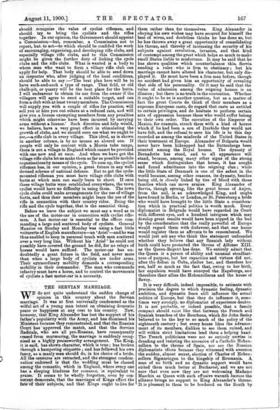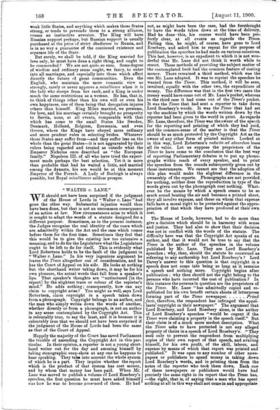THE SERVIAN MARRIAGE.
WE do not quite understand the sudden change of opinion in this country about the Servian. marriage. It was at first universally condemned as the wilful act of a young man intent on obtaining domestic peace or happiness at any cost to his country. Now, however, that King Alexander has lost the supp-ort of his father's popularity with the Army, and has dismissed his Ministers because they remonstrated, and that the Russian Court has approved the match, and that the Servian Radicals, who are all pro-Russian, have consequently ceased from muimuring, the marriage is suddenly recog- nised as a highly praiseworthy arrangement. The King, it is said, has shown character, which is true ; has broken through a hampering etiquette ; and has followed his own fancy, as a manly man should do, in his choice of a bride. All the censures are retracted, and the strongest condem- nation' endorsed is that the wedding must be classed among the romantic, which in England, where every one has a sleeping kindness for romance, is equivalent to praise:- It seems to be wholly forgotten, even by con- sistent democrats, that the marriages of Kings affect the fate of their' SUbjects, and that Kings ought to live for them rather than for themselves. King Alexander in obeying his own wishes may have secured for himself the best of wives, and doubtless thinks he has done so, but he has thrown away a great opportunity of consolidating his throne, and thereby of increasing the security of his subjects against revolution, invasion, and that kind of contempt among the great which helps so much to make small States liable to misfortune. It may be said that he has shown qualities which counterbalance this, Servia needing a ruler - who is firm to obstinacy ; but his marriage cannot have altered his character, but only dis- played it. He must have been a firm man before, though no accident had given him an opportunity of revealing that side of his personality. Or it may be said that the value of admission among the reigning houses is an illusion ; but there is no truth in the contention. Whether it ought to be So is another question, but as a matter of fact the great Courts do think of their members as a supreme European caste, do regard that caste as entitled to certain privileges, and do hesitate to perform certain acts of oppression because those who would suffer belong to their own order. The execution of the Emperor of Mexico, for example, struck them with a kind of horror which if he had been a son of Iturbide they would not have felt, and the refusal to save his life is to this day recorded as among the misdeeds of the United States in their treatment of Europe. Alexander of Bulgaria would never have been kidnapped had the Battenbergs been counted among the Royal houses. The dynasty of Bernadotte has stood, and to all appearance will stand, because, among many other signs of the strong sense which distinguishes that house, it has sought and found' admittance into the reigning clan ; while the little State of Denmark is one of the safest in the world because, among other reasons, its dynasty, besides being old, is closely linked by ties of blood with those families which can move armies. King Alexander of Servia, though sprung, like the great house of Anjou, from the soil, is an acknowledged King, and might have found in Berlin, or London, or St. Petersburg a bride who would have brought to the little State a considera- tion which in practical politics is worth much. Every diplomatist in Belgrade would have regarded its Court with different eyes, and a hundred intrigues which may develop great results would have been nipped in the bud by the consideration that the really powerful of Europe would regard them with disfavour, and that one house would register them as affronts to be remembered. We would just ask any who think this statement unfounded whether they believe that any Spanish lady without birth could have protected the throne of Alfonso XIII. as the Queen-Regent has done. We entirely admit that the Queen is a person of ability and unusual steadfast- ness of purpose, but her capacities and virtues did not, after the defeat in Cuba, shelter her, and therefore her son, half so much as the fact that, owing to her birth, her expulsion would have annoyed the Hapsburgs, and therefore their allies the Hohenzollerns and the house of Savoy.
It is very difficult, indeed impossible, to estimate with precision the degree to which dynastic feeling, dynastic ambition, and dynastic fears still influence the actual politics of Europe, but that they do influence it, some- times very strongly, no diplomatist of experience doubts. It is not probable, or indeed possible, that a family compact should exist like that between the French and Spanish branches of the Bourbons, which Sir John. Seeley believed to be the key to so much of the policy of the eighteenth century ; but every house likes the advance- ment of its members, dislikes to see them ruined, and will within strict limitations lend them a, helping hand. The French politicians were not so entirely unwise in dreading and resisting the accession of a Catholic Hohen- zollern to the throne of Spain, nor are the Russian diplomatists idiots because they witnessed with aversion the sudden, almost secret, election of Charles of Hohen- zollern Sigmaringen to the kingship of Roumania. A man of no birth and no dynastic support would have suited them much better at Bucharest, and we are not sure that even now they are not welcoming Madame Maschin as Queen with such effusive warmth because the alliance brings no support to King Alexander's throne. It is pleasant, to them to be bordered on the South by weak little States, and anything which makes those States strong, or tends to persuade them to a strong alliance, rouses an instinctive aversion.. The King will have Russian support perhaps, hut .Russian support is- usually purchased at the price of strict Obedience to Russia, and is in no way a guarantee of the continued existence and separate life of the State. But surely, we shall be told, if the King married -for love only, he must have done a right thing, and ought to be commended ? We are not quite so sure. Some degree of wisdom and ordinary sense ought, we fancy, to enter into all marriages, and especially into those which affect directly the future of great communities. Even the English, who maintain the more romantic view so strongly, rarely or never approve a misalliance when it is the lady who stoops from her rank, and a King is under much the same restrictions as a woman. He has, that is, to think of things other than his own will or even his own happiness, one of them being that derogation injures others than himself. King Milan married, we presume, for love, and his marriage certainly brought no prosperity to Servia, none, at all events, comparable with that which has come to the small States like Sweden, Denmark, Holland, Belgium, Roumania, and even Greece, where the Kings have obeyed more ordinary and more prudent rules in selecting brides. Whatever those States may suffer from—and they suffer less on the whole than the great States—it is not aggravated by their rulers being regarded and treated as outside what the Emperor Nicholas once described as "the European family." Napoleon III. of all who have tried the experi- ment made perhaps the best selection, Yet it is more than probable that had he waited a little, and married among the dynasts, his son would be at this moment Emperor of the French. A Lady of Burleigh is always possible, but Royal mesalliances seldom prosper.



































 Previous page
Previous page